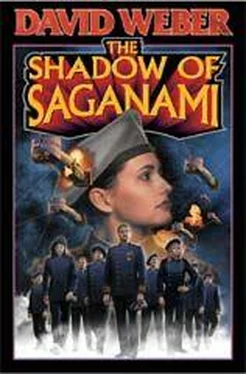She was also armed, although no one in his right mind-and certainly not Duan Binyan-would ever confuse her with a warship. She didn't make any effort to pretend she wasn't armed, although her official papers significantly understated the power of the two lasers she mounted in each broadside and her engineering log always showed that at least one of them was down for lack of spare parts. The Verge could be a dangerous place, and probably ten or fifteen percent of the merchies which plied it were armed, after a fashion, at least. The "inoperable" broadside mount was simply part of Marianne 's down-at-the-heels masquerade, and half her point defense clusters and counter-missiles tubes were concealed behind jettisonable plating, again in keeping with her pretense of parsimonious owners.
All in all, Marianne was capable of holding her own against any pirate she was likely to meet. She could even encounter a light warship-a destroyer, say-from one of the podunk navies out here with a more than even chance of success. And on at least two occasions, Marianne herself had turned "pirate" for specific operations. On the other hand, any modern warship would turn her into so much drifting debris in short order. Which was the reason Duan and his crew vastly preferred to depend upon stealth and guile.
"We're coming up on the outer orbital beacon," De Chabrol announced, and Duan nodded in acknowledgment.
"Go ahead and insert us."
"Okay," De Chabrol acknowledged, and Duan chuckled. His ship might be armed, but no one would ever mistake her bridge routine for something a man-of-war would have tolerated for an instant!
* * *
Agnes Nordbrandt sat in the passenger seat of the battered freight copter as it whirred noisily through the night. Counter-grav air lorries would have been more efficient, and they were common enough on Kornati these days that she probably could have rented one or two without arousing suspicion. But helicopters were cheaper, and so ubiquitous no one could possibly stop all of them for random searches.
This particular helicopter was operating under a perfectly legitimate transponder, although the freight company which owned it wasn't aware of tonight's trip. The pilot, whose mother had been hospitalized for the last eight T-years, was one of the freight company's senior pilots… and also a member of Drazen Divkovic's FAK cell. He'd been with the company for twelve T-years, and part of his arrangement with his employer was that he could use company vehicles to moonlight to supplement the regular salary which somehow had to pay for his mother's hospitalization as well as feed his own wife and children.
Knowing all of that, unfortunately, didn't make Nordbrandt noticeably happier.
The problem was the helicopter's maximum cargo capacity of only twenty-five tons. She had five more, similar helicopters, although two of them couldn't be used long, since they'd been stolen for this operation. Still, even with all six of them, she could transport only a hundred and fifty tons in a single flight. Which meant it would require twenty-six round trips by all six to move her arriving bounty of destruction.
In some ways, that wasn't entirely bad. She'd made arrangements to spread the weapons between several dispersed locations, and that would've required her to break the entire consignment down into smaller increments, anyway. But it was going to take at least a couple of days to move everything, and that much exposure was dangerous.
She didn't like coming out into the open this way herself, either. Not out of any sense of cowardice, although she was honest enough to admit she was afraid on a personal level, but because if the graybacks managed to capture or kill her, the effect on the FAK would be devastating. Indeed, the fact that she'd supposedly been killed once would probably make the psychological effect even worse if she actually was arrested or killed. Yet she didn't have much choice, at least for this first stage of the delivery operation. She had to be on hand, had to be confident her arrangements were working, and had to be available to resolve any last-minute complications which reared their ugly heads.
She'd chosen the delivery site with care, because landing the shuttle was the most hazardous single element of the operation. "Firebrand" had assured her his agents would be well versed in clandestine deliveries, and that they'd be capable of flying a nape-of-the-earth course. She'd taken him at his word and selected a site in the rugged Komazec Hills. It was only three hundred kilometers from Karlovac, but the rough terrain provided plenty of concealed spots. And the hills were close enough to the capital that a cargo shuttle making dispersed deliveries to legitimate customers could duck into their valleys and ridgelines for cover against standard air traffic and police radars without arousing undue suspicion.
There was still a major degree of risk, and most of it was the fault of her own operations. What she thought of as her "I'm Back" strike in the capital lay almost seven T-weeks in the past, but the entire planet was still reeling from its effects. The thought gave her a great deal of satisfaction, but the wildly successful attacks had bloodied the graybacks' nose badly enough to ensure a high degree of alertness. The biggest danger was that some spaceport security officer would doublecheck the cargo shuttle's delivery manifests and discover that the legitimate businesses to which the shuttle was supposedly making direct deliveries weren't expecting anything of the sort. But Firebrand's contacts had managed to find a customs agent willing to look the other way for a price. He was the one who'd certify the shuttle's cargo as whatever innocuous civilian machine tools or spare parts its manifest showed, and he was also the one responsible for confirming the delivery orders. So as long as he stayed bought, the shuttle should be able to lift out from the port without challenge, disappear into the hills, and meet with Nordbrandt's helicopters.
She really wished she could take delivery directly from the spaceport. She and Firebrand had considered the possibility, and it had been attractive in many ways. But the decisive point had been her inability to transport that much cargo in a single flight. She couldn't risk moving her own people in and out through the spaceport security perimeter that often. If anyone saw them meeting out here in the middle of the night, it would sound every security alarm on the planet, of course. But she had a far better chance of not being seen here at all than she would have had of entering and leaving a public spaceport that many times.
Her own helicopter flew along openly enough, trusting in its legitimate transponder code, until it reached the Black River. The Black flowed out of the Komazec Hills to join the larger Liku River which flowed through the heart of Karlovac. The Black was far smaller than the Liku, but it was big enough to have chewed a deep gorge through the Komazecs, and Nordbrandt's pilot abruptly cut his transponder, dipped down into the gorge, and throttled back to a forward speed of no more than fifty kilometers per hour. Twenty-three minutes later, he lifted up over the edge of the gorge, crossed a ridgeline, slid down the further side to an altitude of thirty meters, traveled another twelve kilometers, and then set neatly down in an overgrown, bone-dry wheat field. The farm to which the wheat field belonged had been abandoned when its owner had the misfortune to be walking across the Mall on the day of the Nemanja bombing.
Nordbrandt wasn't immune to the harsh irony which made this particular landing site available. She hadn't had anything in particular against the farm's owner. He'd simply been in the wrong place at the wrong time and become a martyr to Kornatian independence. And now his death was making a second contribution, she thought, as she swung down through the passenger door into the tall wheat.
Читать дальше












